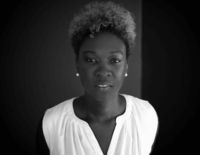The Writer in the World: Love, Write, Resist, Heal, Part Two with Alicia Elliot
By Canisia Lubrin
A Conversation with Alicia Elliot, Part Two
CL: To continue from where we left off: Have you considered the book-length poem? This is not to suggest book-length poems are long-winded, though. Jokes aside, do think of the book-length poem. Or don’t. Don’t let me wag you, Alicia.
Thank you for bringing Violet Lee’s essay to my attention. With it, you’ve touched on something that resonates deeply with my writing life. It reminds me of a conversation I had with someone a few years ago about this very real fact of living first and foremost to survive and how this, in many ways, limits the quality of life that you can live.
This person then asked whether there was much point to a life like that and remarked, with a kind of facile repudiation, that perhaps such people should also have special access to euthanasia. This is a thing that jolted me, as you can imagine. Why immediately characterize the survivor as victim and victim only? Why deal death as the only alternative to survival? Why reduce the value of the lives of the oppressed to this sort of maudlin futility? In the end, this person concluded that anyone who thinks living mainly to survive is any life at all, is deluded. I’d hoped to convince them that the act of survival in itself is proof of living in extreme circumstances. And it may be true that even so, these lives are worth fighting for and worth saving and writing for. And maybe something of this kind of living is modulated by illusions through sheer force of need, that we must first imagine in order make our joys.
There’s also so much fearfulness in a thing that lacks imagination. And this may be part of its refusal to see the possibilities in others. A thing so simplified that it loses any semblance of its particular truths (and by truths I mean possibilities) is a thing in itself life-anemic. You bring up our capacity for healing; I wonder how much of this this need for healing is latched onto some idea of what is just, what is really at the heart the work of writing that centres on liberation.
None of this is to say that the writer who does not actively seek to do this work falls to notoriety. If we believe in the end that we have acted well in our vocations, then any perforations we amass in ourselves, in our egos, and in the name of writing and resisting are spaces that we’ve filled up with our observations of this life, things we hope are worth remembering.
Perhaps this optic of writers as inherent resistors is emblematic of a world that in its brokenness, its great and panoramic life, is mostly a place of diasporic memory. By that I mean to suggest that our determinism is the work of our consciousness(es). Even work that imagines a future, science fiction, say, or work that fancies something otherworldly (past or present), is part of the broader project of reminding or not forgetting things that are constantly in flux. We can think of the arrow of time and throw our hands up and say, well, it is impossible to have any good effect on this current regression into our darkest selves. Ongoing threats of nuclear war, the terror of epic storms that shred whole countries into helplessness, entire communities being wiped out by famine, while other communities throw away enough to amass the size of islands. There is no shortage of confusions to contend with in this life and the writer who writes about the moss-covered rock that I’ve never seen before also has a place in that succession of resistance, or more precisely, liberation; its instances of memory and of revealing some new reflection of the world.
Those of us who make words into this magic are part of the very real dynamism of resistance. Is it possible that in another dimension everything can coexist ad nauseum and we’d need only think of this business of cause and effect as child’s play? Maybe in that place we don’t even have to contend with writing as an essential thing. Maybe we don’t have to ask such questions of ourselves or anyone. Maybe. But this is not this world.
AE: Even the prospect of writing a three-line poem terrifies me! The idea of writing a whole book-length poem is taking it to a whole new level of fear. But I did sleep with the lights on after seeing IT, so my capacity to deal with fear is already pretty questionable.
That conversation you had to have… Ugh. What an absolute nightmare. It really hammers in the notion that empathy has very specific limits - limits that have everything to do with imagination, as you’ve said. When you convince yourself that the very narrow constructs of your own life have made it impossible for you to imagine the lives of others, the struggles of others, how can claim you know to know anything about empathy at all? Yet this is what we’re so often faced with: people who are not willing to empathize, but are desperate to claim they do, in fact, empathize. People who do not listen, but are insistent that they’re listening.
Your CanLit News
Subscribe to Open Book’s newsletter to get local book events, literary content, writing tips, and more in your inbox
That person’s comments are especially disturbing when you think about the ways arguments very similar to theirs have been used historically. Placing less value on the ways that other people live, what other people believe, and so on, then subsequently determining that these differences are evidence these other people don’t even deserve to even live? That’s how so many global atrocities - colonialism, slavery, genocide, mass murder, war - have been rationalized in the first place. How quickly people forget.
I love the idea you propose about diasporic memory and its relation to writers. It’s true, whatever we manage to get down on the page is always an approximation of something else - a past, present or future that lives in our heads, but we can never fully translate with words. How can we? There’s such a gulf between reality as we experience it and reality as we interpret and transcribe it.
We as writers do our best to draw crude outlines, then wait for readers to fill them in with their own memories and meanings and words. We wait for readers to engage with our ideas, and hopefully lead them down a path to grapple with their own ideas, to see and imagine worlds they’d never known before. Maybe that’s always been the true power of literature: to encourage people to empathize and listen without them even realizing they’re doing it. And that’s revolutionary.
_______________________________________________________________________________________________________________________
Alicia Elliott is a Tuscarora writer living in Brantford, Ontario with her husband and daughter. Her literary writing has been published by The Malahat Review, Room, Grain and The New Quarterly, and her current events editorials have been published by CBC, Globe and Mail, Maclean's and Maisonneuve. She's currently Associate Nonfiction Editor at Little Fiction | Big Truths, and a consulting editor with The New Quarterly. Most recently, her essay, "A Mind Spread Out on the Ground" won a National Magazine Award.
The views expressed in the Writer-in-Residence blogs are those held by the authors and do not necessarily reflect the views of Open Book.
Canisia Lubrin was born in St. Lucia. She has had work published in literary journals including Room, The Puritan, This Magazine, Arc, CV2and The City Series #3: Toronto Anthology. She has been an arts administrator and community advocate for close to two decades. Lubrin has contributed to the podcast On The Line, hosted by Kate Sutherland for The Rusty Toque. She studied at York University where she won the President's Prize in poetry and the Sylvia Ellen Hirsch Memorial Award in creative writing. Lubrin holds an MFA from the University of Guelph and teaches at Humber College. She lives in Whitby, Ontario.






